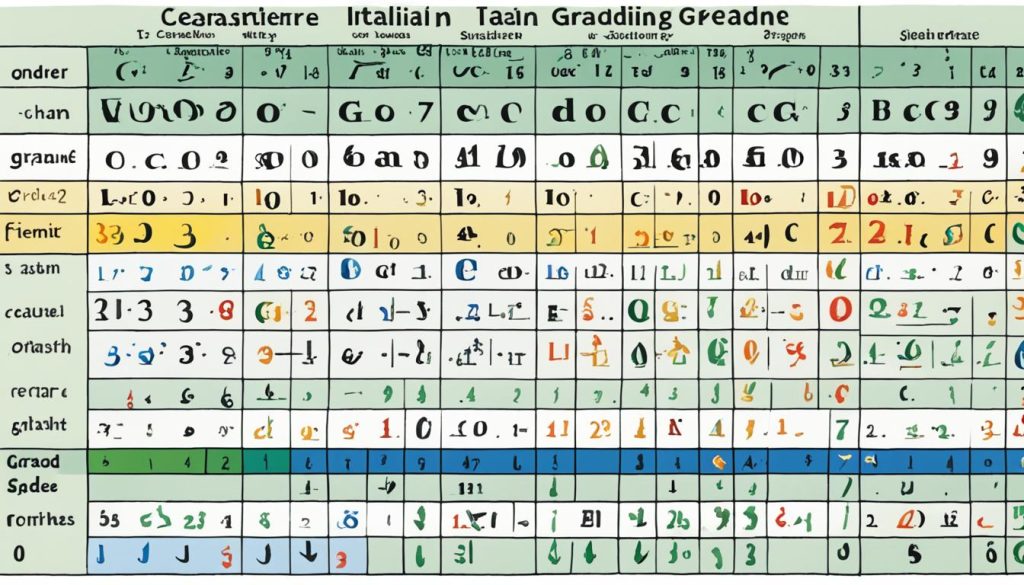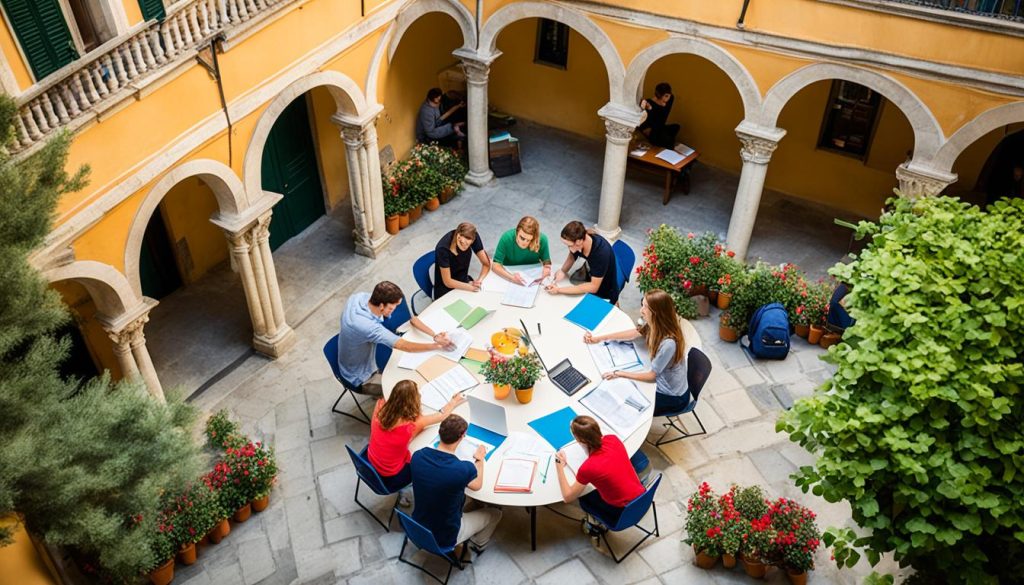Welcome to a journey through Italy’s education system, filled with deep cultural heritage and historical significance. This guide is for global learners, especially those from the UK, thinking about studying in Italy. We’ll cover all levels of education, from primary to higher education, and offer tips for students. Italy is a top choice for international students, offering a place where students can excel both in studies and life.
Key Takeaways
- Italy offers a rich educational framework suitable for global learners.
- Various educational levels include primary, secondary, and higher education.
- The country is growing in popularity among UK students for its unique academic opportunities.
- Practical advice will be provided throughout the article to assist in navigating the system.
- Exploring cultural aspects is integral to understanding education in Italy.
- International education in Italy fosters global perspectives and connections.
Understanding the Italian Education Framework
The Italian education system has a strong legal base, with both national and regional laws. It aims for quality and access for everyone. The system includes early childhood education, compulsory schooling, and higher education. This structure helps students learn for life.
The Ministry of Education, Universities, and Research leads in setting standards. Regional authorities then adapt these policies for local needs. This ensures education fits the community’s culture and society.
Children start learning at daycare and nursery schools. Then, they move to primary school, which is a must for kids aged six to eleven. After that, they go to lower and upper secondary school before moving to higher education.
This structured approach helps Italy maintain its educational values in diverse settings. It makes it easier for students and parents to understand the system.
| Education Stage | Age Range | Compulsory |
|---|---|---|
| Early Childhood Education | 0-6 years | No |
| Primary Education | 6-11 years | Yes |
| Lower Secondary Education | 11-14 years | Yes |
| Upper Secondary Education | 14-19 years | Yes |
| Higher Education | 19+ years | No |
Key Stages of Education in Italy
The education system in Italy has several key stages that shape students’ academic paths. It starts with early childhood education, which is optional for kids from birth to six years. Then, students move to compulsory education, where their learning becomes more structured.
Students are required to attend school from ages 6 to 16. Primary education lasts five years and focuses on basic skills in various subjects. This helps students grow both academically and personally.
Secondary education is divided into two cycles. The first cycle is three years long, and the second cycle lasts five years. This stage is vital as it prepares students for vocational training or further education.
After secondary education, students can choose between vocational training or higher education. Vocational training focuses on practical skills for different careers. Those opting for higher education pursue advanced studies, opening doors to many professional opportunities.
Education in Italy: Primary and Secondary Levels
The Italian education system has different phases for students of various ages. It’s important to know about primary and secondary education. This section will cover these levels and the education Italy offers.
Structure of Primary Education
Primary education in Italy is for five years and is for kids aged 6 to 11. It’s the first step in a child’s learning journey. The main subjects are:
- Italian language
- Mathematics
- Science
- Art
- Physical Education
The curriculum aims for a well-rounded development. It encourages critical thinking and creativity early on. Assessments check on progress and understanding, not just exam scores.
Overview of Secondary Education
After primary school, students move to secondary education in Italy. It has two parts: lower and upper secondary. Lower secondary is for three years and is for 11 to 14-year-olds. It covers a wide range of subjects.
Upper secondary lasts five years and offers different paths based on interests and career goals. There are:
- Liceo: Prepares students for university.
- Istituti tecnici: Mixes academic and practical skills.
- Istituti professionali: Focuses on specific professions.
These options let students pick paths that match their future goals. This ensures a detailed education suited to their talents and interests.
| Education Level | Duration | Age Range | Key Focus Areas |
|---|---|---|---|
| Primary Education | 5 years | 6-11 years | Fundamental subjects including Italian, Mathematics, Science, Art |
| Lower Secondary Education | 3 years | 11-14 years | Broader subject area with foundational skills |
| Upper Secondary Education | 5 years | 14-19 years | Academic, technical, or vocational pathways |
Higher Education Opportunities in Italy
Italy is a great place for higher education, with a wide range of courses and career goals. Its universities are famous for their history and top-quality education. It’s important to know about the different universities and what you need to apply if you’re coming from abroad.
Types of Universities in Italy
Italy has many types of universities, each offering unique courses and chances:
- Public Universities: These are funded by the state and offer a variety of courses at both undergraduate and postgraduate levels. They follow the European Credit Transfer and Accumulation System (ECTS).
- Private Universities: These focus on specific areas and usually have smaller classes. They offer special and innovative courses.
- Specialised Colleges: These are all about one thing, like arts, music, or fashion. They let you really dive deep into your chosen subject.
Admission Requirements for International Students
If you want to study in Italy, you’ll need to meet certain requirements. You’ll need to provide:
- Academic Transcripts: These are your official school records, translated into Italian or English.
- Language Proficiency: You’ll need to show you can speak Italian or English, depending on the course.
- Entrance Exams: Some courses might ask for exams or portfolios, especially if you’re applying for the arts.
Italian Language Courses for Global Learners
Studying Italian is key for anyone wanting to boost their time in Italy. There are many Italian language courses for all levels, from beginners to experts. Universities and private schools offer different types of courses to fit what each learner needs.
Learning Italian through culture is a great way to dive deep into the language. It combines language skills with the rich culture of Italy. Many schools offer scholarships for international students, making it easier to study Italian.
When choosing a course, think about what you want to get out of it. Here’s a table to help you compare different course options:
| Course Type | Duration | Typical Cost | Level of Intensity |
|---|---|---|---|
| University Programmes | 1-2 semesters | £3,000 – £7,000 | High |
| Private Language Schools | 4-12 weeks | £500 – £2,000 | Moderate |
| Immersive Cultural Courses | 2-4 weeks | £1,000 – £3,000 | Intensive |
Picking the right Italian course is crucial for a great experience in Italy. With so many choices, learners can easily find a course that meets their goals and interests.
Cost of Education in Italy

For international students, knowing the cost of studying in Italy is key. This section will give you a clear view of tuition fees and living costs. It’s important to understand these expenses before you start your studies.
Tuition Fees at Various Levels
Tuition fees in Italy change depending on the institution and level of study. Public universities usually charge less than private ones. Here’s what international students can expect to pay:
| Educational Level | Public Universities | Private Universities |
|---|---|---|
| Undergraduate | €1,000 – €4,000 per year | €6,000 – €20,000 per year |
| Postgraduate | €1,500 – €5,000 per year | €5,000 – €25,000 per year |
| PhD | €1,000 – €2,500 per year | €6,000 – €15,000 per year |
There are also one-time fees, which can be €100 to €300. But, scholarships and financial aid can help reduce costs for many students.
Living Expenses for Students
Living costs in Italy depend on where you are and how you choose to live. Here’s a rough idea of monthly expenses:
- Accommodation: €300 – €800
- Food: €200 – €400
- Transport: €35 – €70
- Health Insurance: €30 – €50
Planning your budget is key to a smooth study abroad experience. Knowing these costs helps you prepare for your time in Italy.
Scholarships and Financial Aid for UK Students
UK students wanting to study in Italy have many funding options. These help make studying abroad less expensive. Scholarships come from the government, universities, and private groups.
Government scholarships are great for international students. They help those looking for global learning experiences. It’s important to know how to apply and what you need for these scholarships.
Italian universities also offer scholarships for international students. They look for academic talent and certain subjects. Check the universities you’re interested in for these scholarships.
Private groups and foundations offer more financial help. These can add to what you get from universities and the government. Looking into these can help a lot.
Applying for scholarships and aid needs careful planning. A good personal statement and strong references are key. Showing why you want to study in Italy and your future plans can impress the reviewers.
How to Apply for Student Visas in Italy
Getting a student visa for Italy is key for international students wanting to study there. The process might seem hard, but knowing what you need makes it easier.
To get a visa, you need to show you’ve been accepted into an Italian school, have enough money for living costs, and health insurance. You’ll need to provide documents like:
- Completed visa application form
- Valid passport
- Letter of admission from the educational institution
- Proof of adequate financial means
- Health insurance policy
- Passport-sized photographs
Start your visa application three months before you plan to travel. This gives you time for any delays in processing. After arriving in Italy, you must register with the authorities and get a residence permit within eight days.
If you don’t follow these rules, you could face problems staying in Italy legally. So, it’s a good idea to learn all about the visa process well in advance.
| Step | Action | Timeline |
|---|---|---|
| 1 | Gather Required Documents | 3–4 weeks before application |
| 2 | Submit Visa Application | At least 3 months before travel |
| 3 | Receive Visa Decision | Usually within 2–3 weeks |
| 4 | Travel to Italy | As per visa validity |
| 5 | Register with Local Authorities | Within 8 days of arrival |
Understanding the Grading System in Italy

In Italy, the way they grade students is quite different from what UK students are used to. Grades range from 0 to 30, with 18 needed to pass. This system is unique and stands out when compared to the UK’s.
Comparison with the UK Grading System
It’s key to see how Italy’s grading system differs from the UK’s. Italy uses a simpler approach:
| Italy Grading Scale | Equivalent UK Grade |
|---|---|
| 30 e lode (30 with honours) | First Class |
| 27-29 | Upper Second Class |
| 24-26 | Lower Second Class |
| 18-23 | Third Class |
| 0-17 | Fail |
Students aiming to study in Italy or elsewhere will find it helpful to know these differences. It’s important for UK students to understand their grades in this new context.
Cultural Adjustment for International Students
Studying in Italy can be tough for international students. They need to get used to the way Italians communicate, what’s expected in class, and how to interact socially. Getting used to these differences is key to doing well and enjoying their time in Italy.
Adapting to Italian Academic Culture
Italian education is quite different from what many students are used to. In class, students are encouraged to speak up and share their thoughts. Group work is common, which means working together and learning from each other. Students need to be brave and connect with their classmates.
Knowing about local customs also helps. It makes it easier to get along with teachers and other students. Here are some tips to help you fit in:
- Engage in group projects and discussions
- Consider informal interactions with peers and professors
- Be open to different teaching styles and evaluation methods
- Familiarise yourself with local customs and etiquette
Getting to know the Italian way of teaching will make your transition smoother. It will help you do well and enjoy your time in Italy. Focusing on making friends and communicating will make your experience rewarding.
Student Support Services in Italian Institutions
Italian schools offer a strong support system for students, helping them succeed in both studies and life. They provide many services to make sure every student feels supported and important. These services help students grow and do well in their studies.
Academic advising is a big part of student support in Italy. It helps students choose the right courses and plan their studies. Advisors work with students from other countries to make their study abroad experience smoother.
Counselling services are key for looking after students’ mental health. Experts are there to help with stress and personal problems. This means students can get the emotional support they need while studying.
Getting help with admin tasks is also important for students. Schools have teams to assist with things like visa forms and official paperwork. This helps students avoid stress and focus on their studies.
Student groups add to the sense of community and offer more ways to get support. They plan events, workshops, and social events. These groups help students connect, feel part of a group, and share their stories.
In summary, Italian schools offer full support for students. With help in choosing courses, mental health support, admin help, and group activities, students get a supportive environment. This helps them succeed and feel good.
| Type of Support | Description |
|---|---|
| Academic Advising | Guidance in course selection and academic planning |
| Counselling Services | Support for mental health and personal issues |
| Administrative Assistance | Help with paperwork and bureaucratic processes |
| Student Associations | Social and community-building activities |
Popular Subjects and Courses for International Students

Italy draws many international students with its popular courses Italy. These include arts, fashion, business, engineering, and culinary studies. These subjects are sought after by those wanting to excel in these areas.
Italy is known worldwide for its excellence in these subjects. Cities like Florence and Venice are hubs for art. Milan is famous for fashion. Bocconi University and Politecnico di Milano are top names in business and engineering.
International students find a wide range of study options Italy offers. The Apicius Institute in Florence teaches traditional and modern cooking. This lets students dive deep into Italy’s food culture.
Many courses combine theory with practical learning. Students get to work with professionals through internships and workshops. This approach makes learning more engaging and effective.
Choosing popular courses Italy offers a special chance for international students. It lets them master subjects closely tied to Italy’s culture and traditions.
Networking and Career Opportunities in Italy
Networking is key for students in Italy to find different career paths. Meeting other students, alumni, and experts can lead to internships and part-time jobs. Universities work closely with companies, helping students get hands-on experience and skills.
Going to professional events, conferences, and workshops helps students meet employers. Universities often set up these events to boost students’ careers. Being part of professional groups in your field gives more support and ways to network.
Having a strong professional network in Italy makes you more employable and gives you deeper insights into your industry. Many employers like candidates who have work experience and connections in their field. So, networking is vital for career growth.
Here’s a table showing popular networking events and how they help with professional growth:
| Event Name | Target Audience | Key Benefits |
|---|---|---|
| Italian Job Fair | Students and Graduates | Meet potential employers and learn about job openings |
| Networking Week | Professional Associations | Workshops and seminars on industry trends |
| University Conferences | Academics and Professionals | Present research and gain industry contacts |
| Industry Meetups | Sector-Specific Professionals | Build relationships and collaborate on projects |
In summary, using networking chances greatly improves career chances in Italy and helps with professional success.
International Collaboration in Education
Italy leads in international education, building strong global partnerships. These partnerships offer many chances, like joint-degree programmes and student exchanges. They help students grow personally and culturally as they study abroad.
Many Italian universities join global partnerships, letting students explore different learning settings. This teamwork boosts the quality of courses and encourages new research. It helps solve big global problems.
Italy’s focus on study abroad programmes is key in its education scene. It has made partnerships with universities all over the world. This lets students study in Italy and abroad, gaining skills for our connected world.
Italy’s work in international education shows its dedication to top-notch education. It helps students and builds strong ties between countries and cultures. This work is crucial for students’ success and for global understanding.
Future Trends in Italian Education for Global Learners
Looking ahead, Italy’s education scene is set for big changes. Digital tools are becoming key, making learning more interactive and accessible for students everywhere. This change updates the way we teach and prepares students for a digital world.
There’s also a big push for sustainability in schools. Italian schools are adding eco-friendly lessons to their programs. This helps students tackle global issues like climate change, making them ready to be active global citizens.
The idea of lifelong learning is also taking off. It means people can keep learning at any age, helping them grow personally and professionally. These changes show Italy is a leader in education, offering a rich learning environment for all.
FAQ
What are the key stages of education in Italy?
In Italy, education has early childhood, compulsory, and higher stages. Compulsory education spans from ages 6 to 16. It includes primary and secondary schooling. Higher education offers degrees like bachelor’s, master’s, and doctoral programmes.
What is the structure of primary education in Italy?
Primary education in Italy lasts five years. It focuses on core subjects like Italian, maths, science, and arts. This stage builds essential skills and knowledge for further education.
How do admission requirements for higher education differ for international students?
For international students, admission to Italian universities requires proof of previous education and language skills. Some may need to pass entrance exams. It’s key to check the specific requirements of the university you’re applying to.
What are the costs associated with studying in Italy?
Studying in Italy varies in cost by education level and institution type. Tuition fees for higher education range from €1,000 to €20,000 a year. Living costs, like accommodation and food, also need to be considered.
Are there scholarships available for UK students studying in Italy?
Yes, UK students can find scholarships and financial aid in Italy. Options include government scholarships, university awards, and private funding. These help with tuition and living costs.
What is the application process for a student visa in Italy?
Applying for a student visa in Italy needs an acceptance letter, proof of funds, and health insurance. Students should apply early for their visa before starting studies.
How does the Italian grading system compare to the UK grading system?
Italy uses a 0 to 30 grading scale, with 18 needed to pass. The UK uses a system with First Class and Upper Second Class categories. It’s important for UK students to understand these differences when moving between systems.
What kind of support services are available for international students in Italy?
Italian schools offer support like academic advice, counselling, and help with admin tasks. Student groups also provide community support and networking chances.
What popular courses are available for international students in Italy?
International students in Italy can choose from arts, fashion, business, engineering, and culinary studies. Top schools offer special programmes in these areas, showing Italy’s global reputation.
How can international students network and find career opportunities in Italy?
Students can boost their careers by doing internships, part-time jobs, and attending university events. Joining professional groups also helps with networking and finding job opportunities.









